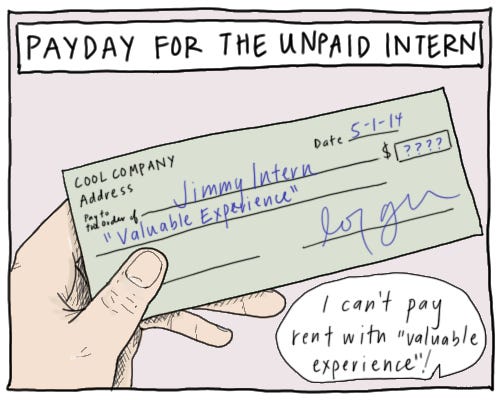The Internship Trap: How Experience Became Exploitation

After graduation or sometimes just at the verge of graduating, many young people stand at the threshold of what they were told would be their first real job. The adverts promise “graduate trainee, get experience, learn and possibly convert to full-time”. Youths step in, in their numbers, feeling hopeful and calibrated for growth. But in Nigeria and across Africa, that threshold has quietly become a platform for free labour disguised as opportunity. What began as a stepping-stone now often leads sideways and not not upwards, with the cost being paid not only in transport, airtime and hours, but in dignity, momentum and years of life deferred.
The internship, once a useful path-finder, is now too often a trap. And now, several young persons across Nigeria and beyond have started wondering if “willing to learn” has become code for “willing to work for nothing”.
Promise and Price
In a country where the official job market cannot absorb every graduate, internships have become the default stop. Organizations advertise internship roles, often framing it as a mutually beneficial arrangement. In practice, however, this arrangement is almost always lopsided. Many interns find themselves performing full-time duties with no compensation, while the promise of “experience” remains abstract.
Considering the everyday reality for a young individual commuting from Lagos Mainland to an office in Victoria Island. The transport costs alone runs into tens of thousands of naira each week, with additional expenses for meals, data and other self-care items. Yet, despite these sacrifices, the reward often amounts only to nothing more than a sentence on a resume. The hidden cost of unpaid internships extends beyond money; it includes energy, time and emotions. Young people invest relentlessly, while organizations benefit without equivalent commitment. The promise of opportunity is overshadowed by the reality of exploitation.

Underemployment in Plain Sight
Ideally, internships are designed as stepping stones. In Nigeria, however, they often become prolonged rollercoasters, a holding system where people are trapped under the intern title while performing substantial work. As the months turn into years, the boundary between temporary training and prolonged underemployment blurs.
Take, for instance, the health sector, where an investigation by Saturday PUNCH revealed that many federal and state hospitals sell their internship slots to graduates in Pharmacy, Nursing, and Medical Laboratory Science for amounts ranging between N200,000 and N500,000. In such cases, internship becomes a transactional system rather than a developmental one, where entry is purchased rather than earned through merit or skill. This leads to accumulated experience on paper but with no economic independence or real job security.
The larger pattern revealed here is one of structural inefficiency. Internships are celebrated as a necessary step in the upwards journey, yet they often entrap youth in stagnation. The career ladder, which is meant to facilitate progression then transforms into a treadmill, encouraging activity without forward momentum.
Who Can Afford the Opportunity?
In unpaid internships, the opportunity is promoted as universally available, yet the costs associated with participation are quite significant and altogether prohibitive. Participants are expected to cover any personal costs, effectively filtering out anyone without adequate financial cushioning.
In the end, only those from stable or affluent backgrounds can manage the hidden costs, highlighting how unpaid internships reproduce inequality. So, the doors are open, but privilege quietly dictates access. Interns may need family support, private transportation or accommodation near the workplace just to participate.
This exclusion reinforces existing socioeconomic divides, as graduates from less privileged backgrounds face multiple disadvantages such as limited exposure, financial strain and the emotional burden of trying to meet an expectation that the system was never designed to accommodate fairly.
Learning or Labour?
Internships are meant to focus on skill acquisition, mentorship and professional development. Yet, across sectors, what many young people encounter is labor masquerading as learning. In local government placements, for instance, interns are routinely underpaid, overworked and provided with little to no structured guidance. The line between education and exploitation becomes indistinct when interns perform tasks that generate real organizational value without recognition or fair remuneration for them. When tasks generate economic benefit, but the person performing them is treated merely as a learner, the ethical and practical boundaries of the internship are violated. The long hours, high expectations and accountability without compensation that interns have to face basically depicts this: the veil of learning masks what is essentially unpaid labor, leaving graduates exhausted, underappreciated and demoralized.
Furthermore, the blurred line between labor and learning can have long-term consequences. Graduates accustomed to unpaid or undervalued work may internalize the expectation that effort does not require recompense, reinforcing systemic undervaluation of young talent.
The Toll - Identity, Dignity, Time
The human cost of unpaid internships extends far beyond financial strain. Weeks morph into months, months into years, and each day spent in hope without tangible reward erodes ambition and self-esteem. A young Nigerian writer once lamented:
“How, am I expected, as a young Nigerian professional, to have completed both bachelor and master degree and already possess three years of work experience while still being below 25 years old.”
The mismatch between expectation and reality affects both identity and dignity. Young graduates delay milestones such as moving out, saving and investing in personal growth, while peers appear to advance professionally. Psychologically, repeated exposure to unacknowledged labour can foster frustration, disillusionment and a diminished sense of personal initiative.
Internship experiences are often measured in numbers and duration, but the qualitative impact, the wear on ambition, confidence and mental health is far more significant.
Exceptions and Shifts: Hope, Not Hype
Despite the widespread exploitations, some programs offer a blueprint for what internships should be. Paid six-month programs with mentorship, meaningful tasks and transparent conversion prospects demonstrate that internships can fulfill their promise as career stepping-stones. Graduates report not only skill acquisition but also increased confidence, networking opportunities and a genuine sense of progression other than stagnancy.
Yet, these remain exceptions rather than the norm. Hence, a system-wide reform is needed: internships should combine fair remuneration, structured mentorship, measurable learning outcomes and equal access. Young people should not rely on chance, charity or familial support to benefit from these opportunities. Fairly structured internships validate labour, acknowledge contribution and provide a bridge into professional life, which is the very purpose internships were meant to serve.

Time to Redraw the Promise
Across Nigeria and Africa more broadly, the intern generation is calling for recalibration. The value interns create must be acknowledged and reciprocated. Time, energy, and commitment are not discounts, they are currency that deserves recognition. Internships should serve as entry points, not traps. They should be designed to foster development, financial stability and professional growth. Only when opportunities are meaningful, structured and fair can the promises of internships align with the actual reality, ensuring that ambition and labor are rewarded justly.
Recommended Articles
You may also like...
Bundesliga's New Nigerian Star Shines: Ogundu's Explosive Augsburg Debut!

Nigerian players experienced a weekend of mixed results in the German Bundesliga's 23rd match day. Uchenna Ogundu enjoye...
Capello Unleashes Juventus' Secret Weapon Against Osimhen in UCL Showdown!

Juventus faces an uphill battle against Galatasaray in the UEFA Champions League Round of 16 second leg, needing to over...
Berlinale Shocker: 'Yellow Letters' Takes Golden Bear, 'AnyMart' Director Debuts!

The Berlin Film Festival honored
Shocking Trend: Sudan's 'Lion Cubs' – Child Soldiers Going Viral on TikTok

A joint investigation reveals that child soldiers, dubbed 'lion cubs,' have become viral sensations on TikTok and other ...
Gregory Maqoma's 'Genesis': A Powerful Artistic Call for Healing in South Africa

Gregory Maqoma's new dance-opera, "Genesis: The Beginning and End of Time," has premiered in Cape Town, offering a capti...
Massive Rivian 2026.03 Update Boosts R1 Performance and Utility!

Rivian's latest software update, 2026.03, brings substantial enhancements to its R1S SUV and R1T pickup, broadening perf...
Bitcoin's Dire 29% Drop: VanEck Signals Seller Exhaustion Amid Market Carnage!

Bitcoin has suffered a sharp 29% price drop, but a VanEck report suggests seller exhaustion and a potential market botto...
Crypto Titans Shake-Up: Ripple & Deutsche Bank Partner, XRP Dips, CZ's UAE Bitcoin Mining Role Revealed!

Deutsche Bank is set to adopt Ripple's technology for faster, cheaper cross-border payments, marking a significant insti...

